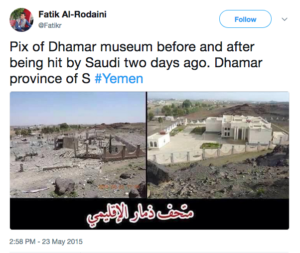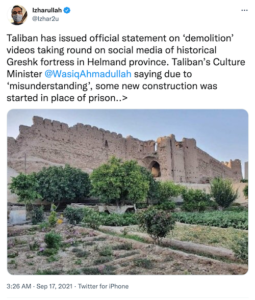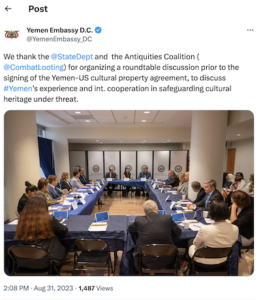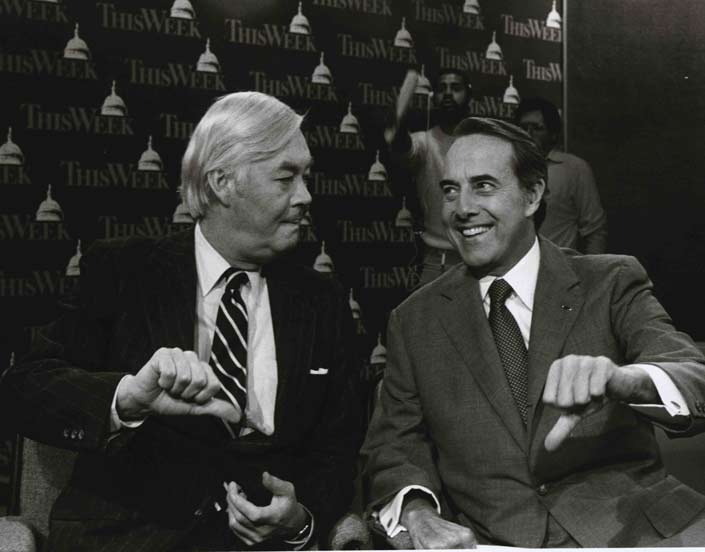
Sen. Daniel Patrick Moynihan (D-NY) with his wife, Liz. Photo Michael Geissinger, U.S. Library of Congress.
In a very small corner of Heaven is a space reserved for the few politicians deemed worthy to enter the promised land. There, the spectral forms of Daniel Patrick Moynihan and Bob Dole are engaged in a another one of their many policy discussions. These meetings typically take place at the “Spirit World” bar over a bottle of ethereal “no hangover” whiskey. As is usually the case, the topics relate to their long service together in the US Senate. Today, news from the “Terrestrial World” that the US State Department was considering a cultural property agreement with Lebanon animated their discussion. That cultural property agreement or Memorandum of Understanding (MOU) was authorized by a statute they cosponsored back in the 1980s, the Cultural Property Implementation Act or CPIA.
“What must the State Department be thinking?” asked Dole. “If the point is to protect cultural heritage, a MOU with Lebanon makes absolutely no sense,” he continued. Both knew that Lebanon is a failing state that has faced one disaster after another for the past half century. First, there was a Civil War between 1975 and 1990 that resulted in an estimated 120,000 fatalities. Since then, things have only deteriorated. The Syrian military occupied the country from 1976 to 2005. Then, Lebanon was forced to accept 1.5 million refugees from the 2011 Syrian civil war. And even more recently, the Lebanese suffered further from a financial crisis starting in 2019, and a massive explosion in 2020 at the Port of Beirut which was blamed on gross bureaucratic negligence. Indeed, repairing damage to a museum caused by that massive, blast of stored explosives had to be paid with foreign donations because the Lebanese themselves are broke.

Images of Dhamar Museum, Yemen, before and after being hit by Saudi aircraft. February 13, 2018.
Dole continued, “What’s really nuts is that the power in Lebanon today is not the corrupt and incompetent government, but Hezbollah, a terrorist group which serves as Iran’s proxy force against Israel and the United States.” Of course, both Dole and Moynihan knew all too well what Hezbollah was capable of since the 1983 bombing of the Marine barracks in Beirut. Given its power over the Lebanese state, they both wondered if any antiquities that may be repatriated under any MOU will just be resold to help fund Hezbollah’s jihad against Israel and America.
They also knew that even as the State Department was considering a MOU with Lebanon that would repatriate “undocumented” cultural property there, ongoing fighting between Hezbollah and Israel had made the situation so dangerous that the US was urging its citizens to leave. “So, it makes perfect sense then to send valuable antiquities back to Lebanon so they can be bombed into dust,” quipped Dole. “It wasn’t supposed to be this way,” Moynihan exclaimed. Dole nodded and continued, “Remember, when we set up the CPIA, we added significant procedural and substantive constraints on executive authority, including a self-help requirement and a requirement that any agreement protect legitimate cultural exchange.”

Sen. Bob Dole (R-KS) on a balcony outside his Minority Leader’s office at the U.S. Capitol, 1990, Photo Michael Geissinger, US Library of Congress.
Moynihan nodded his head in agreement, but then noted, “The real problem is that the CPIA no longer serves its original purpose of protecting archaeological and ethnological objects of cultural significance. Instead, the State Department views it as a ‘soft power tool’ to ‘engage’ with even some of the most dysfunctional, dictatorial and anti-American regimes on the planet.”
The perceived need to exercise “soft power” has been used to justify MOUs or “emergency import restrictions” on behalf of Afghanistan, Libya, Mali, Syria and Yemen. Given that such authoritarian regimes typically declare their rights to ownership and control over everything “old,” these decisions provide US recognition of the rights of these regimes to ownership or control of virtually all archaeological and ethnological objects ever made or found in those countries. Moynihan continued, “So much for the ‘independent judgment’ the US was supposed to apply in such matters to protect the rights of American citizens to cultural exchange.”

Taliban’s Twitter response to video of bulldozer knocking over wall at ancient fortress, Greshk, Afghanistan.
“I saw it coming,” added Moynihan as he reminded Dole about S. 1696, a bill he introduced at the end of his career. That legislation sought to make the MOU process more transparent, more responsive to public comments, and more focused on addressing current rather than historical looting. Unfortunately, the bill went nowhere, primarily due to opposition from archeological advocacy groups working hand in hand with the State Department. These groups have every interest in supporting the requests of foreign governments that offer archaeologists excavation permits.
Moynihan intoned, “If anything, it’s only gotten worse.” From his perch in heaven, Moynihan had watched over the years as archaeological advocacy groups embedded themselves so thoroughly in the process that they both received funding to help justify MOUs and other times provided funding to the State Department to help source countries make new requests.
Other checks on State Department authority were also neutered over time. The CPIA provided for a “Cultural Property Advisory Committee” or “CPAC,” to represent the interests the public, museums, the trade in cultural artifacts, and archaeologists, but CPAC these days only represents the interests of the most strident archaeological advocacy groups. Seats reserved for the public, the trade, and museums are filled with political appointees who are either sympathetic with strident archaeological views or have little or no experience in handling archaeological or ethnological objects subject to the CPIA. Finally, archaeological advocacy groups even have their hand in enforcement. They both conduct training for Homeland Security and also serve as their experts in cultural property forfeiture cases.

Yemen Embassy Twitter announcement thanking Antiquities Coalition for organizing roundtable. Yemeni Embassy, August 31, 2023.
As a result, import restrictions not only target overlapping types of artifacts from many different countries, but are broadly enforced as embargoes on all “designated” materials imported from legitimate markets in Europe. This allows Homeland Security to “claw back” all sorts of archaeological or ethnological material so it can be “repatriated” at elaborate embassy ceremonies. No matter that there is no such thing as “safe keeping” in Lebanon or places like Afghanistan, Libya, Mali, Syria, and Yemen.
Moynihan continued,
“Look at the latest MOUs with Libya and Yemen if you want to see how things really work these days.”
Libya may be so dangerous that the American Society of Overseas Research, working under a $800,000 State Department contract, did not even dare to enter the country to interview Libyan officials in person, but that did not stop them from writing a report to justify a 2023 cultural property MOU with “the internationally recognized government of Libya,” which in fact represents only one faction in an ongoing civil war. The 2023 MOU with a Yemeni faction, allied with Saudi Arabia, was even more egregious. It bypassed both CPAC review and public comment, and instead was announced at an invitation only event for officials of the respective governments and representatives of the archaeological advocacy groups that helped make it all happen. No matter that this faction and its Saudi allies themselves stand accused of intentionally destroying Yemeni cultural heritage, including of bombing a museum filled with antiquities into dust. Or that this “government” controls only a small portion of the country, with most of Yemen’s territory being held by another Iranian proxy, the Houthis.

Senator Daniel Patrick Moynihan in 1977, US Library of Congress.
Moynihan ended with the observation that things only really went off the rails after both he and Dole left the Senate. He exclaimed, “With us gone, the bureaucracy soon came to realize no one was looking over their shoulders.” “So what now?” asked Dole. Moynihan sighed, “I guess that depends on the living, not us Senatorial spirits up here in heaven.”
* Peter K. Tompa is a semi-retired lawyer who resides in Washington, D.C. He has written extensively about cultural heritage issues, particularly those of interest to the numismatic trade. Peter contributed to Who Owns the Past?” (K. Fitz Gibbon, ed. Rutgers 2005). He formerly served as Executive Director of the Global Heritage Alliance and now is a member of its Board of Directors. He currently serves as the Executive Director of the International Association of Professional Numismatists. This article is a public resource for general information and opinion about cultural property issues and is not intended to be a source for legal advice. Any factual patterns discussed may or may not be inspired by real people and events. The opinions stated in this article are the author’s alone and should not be attributed to any affiliated organization.
Next Installment: It’s the Political Season So Why Not Collect Political Memorabilia?
Further Reading:
On Lebanon
Cultural Property Advisory Committee Meeting, September 24-26, 2024, Cultural Heritage Center, Bureau of Educational and Cultural Affairs (July 22, 2024).
Irfan ul Haq, Iran and Hezbollah: Proxy Power Play, Institute for Security & Development Policy (March 26, 2024).
Kareem Chehayeb, From ashes and debris, iconic Beirut museum reopens 3 years after massive damage from port blast, AP (May 27, 2023).
Lebanon: UN expert warns of ‘failing State’ amid widespread poverty, United Nations, Human Rights, Office of the High Commissioner (May 11, 2022).
Mark Milligan, Lebanon’s archaeological crisis & status on antiquities, Heritage Daily (January 5, 2022).
Kate Fitz Gibbon, At Great Expense, Manhattan DA Returns Fakes to Lebanon, Cultural Property News (January 5, 2024).
Habib Battah, Searching for Lebanon’s Ancient Ruins Amid Capitalist Ruination, Public Source (March 22, 2022).
2020 Beirut Explosion, Wikipedia.
Modern Day Phoenician Treasure Hunters, Kim’s View (undated).
Foreign Terrorist Organizations, Bureau of Counterterrorism, U.S. Department of State (undated).
On State Department Administration of the CPIA
Peter K. Tompa, Careful Collector No. 22 – Your Tax Dollars at Work, Cultural Property News (December 28, 2023).
CCP Staff, U.S. Signs MOU with Yemen. This Time, No Testimony Allowed, Cultural Property News (September 7, 2023).
Kate Fitz Gibbon, CCP & GHA Testimony on Yemen’s Request for Cultural Property Restrictions, Cultural Property News (October 29, 2019).
Peter K. Tompa, The Careful Collector: Don’t Import Buyer’s Remorse, Cultural Property News (undated).
Nancy Wilkie, From the President: Moynihan’s Mischief, Archaeology Magazine (November-December 2000).
Current Agreements and Import Restrictions, Bureau of Educational and Cultural Affairs, Cultural Heritage Center, U.S. Department of State (undated).
S. 1696 (106th): Cultural Property Procedural Reform Act, Govtrack.us.
 Senators Bob Dole and Patrick Moynihan give a joint 'thumbs down' on The David Brinkley Show, 1980s.
Senators Bob Dole and Patrick Moynihan give a joint 'thumbs down' on The David Brinkley Show, 1980s. 

